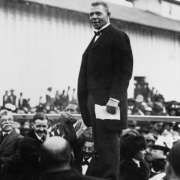The early 21st century is commonly known as the Information Age. Its genesis was the digital revolution that began in the 1950s, and made possible by the alternating current and wireless transmission pioneered by Poetic Justice Warrior Nikola Tesla. Some of its hallmarks are a knowledge-based economy and a global high tech industry. Of course, the internet is now the hub for social, political, and commercial communication and product delivery. The extraordinarily powerful network known as the world wide web is creating new networks of people and ideas, and it is exposing the inefficiency and corruption inherent in traditional hierarchical organizations.
However, there was another information age that had an even greater impact on human flourishing, and it also exposed the inefficiency and corruption inherent in traditional hierarchies. Much like the last half of the 20th century opened up vast markets for scarce and unknown luxuries, so did the last half of the 17th century. Particularly in Holland and England, ships were arriving from across the globe laden with sugar, spices, cotton, porcelain, tea and coffee. Wealth no longer had to be inherited, and fortunes could be built without the violence of the previous 1000 years. It could be earned, discovered, accumulated, invested, and protected from loss through peaceful and voluntary exchange. And it is the Poetic Justice Warrior Edward Lloyd who was the entrepreneurial firebrand who facilitated the rapid expansion of free enterprise.
The Information Problem
The sheer volume of new global trade created great demands for information about new trade routes, weather patterns, and sailing times between destinations. As economist Friedrich Hayek explains in his well-known essay The Use of Knowledge in Society, no one entity can possibly know everything that all of the market participants know individually. According to author Peter L. Bernstein in his book Against the Gods, even England’s Chief Secretary to the Admiralty knew that his knowledge was insufficient.
Samuel Pepys frequented a coffee house to get news of the arrival of ships he was interested in; he deemed the news he received there to be more reliable than what he learned at his job at the Admiralty.
The proprietor of the coffee house favored by Pepys was Edward Lloyd, and the reason is simple. Like all great entrepreneurs, Lloyd best understood the needs of his customers and created innovative ways to serve those needs. Like the world wide web, he was open for business every day, day and night. His customers were the merchant class doing business along London’s docks. They were ship’s captains, importers and exporters, and risk underwriters. Lloyd knew better than anyone that the most important service he could deliver to these particular customers was information. In 1696 he began publishing Lloyds List, a pamphlet that included information about ship arrivals and departures as well as intelligence on conditions abroad and at sea.
First Mover Advantage
Edward Lloyd’s Coffee Shop on Tower Street opened in 1687, a mere 50 years after coffee was first introduced in England. This was a time when ships and money converged on London, and each coffeehouse had its own specialized clientele, and Lloyd’s were ship owners and merchants. His first customers were primarily men from the ships moored nearby, and it quickly became a favorite (there would about 80 coffeehouses in London by then) because, according to local publications, “the house was spacious, well-built, and inhabited by able tradesmen.” Business was booming, and four years later Lloyd moved it to a much larger and more luxurious location on Lombard Street. It was described at the time as “very neat and shined.”
It was also strategically positioned across from the Royal Exchange where Lloyd employed a staff of five. To further serve his customers and attract new ones, he also hosted regular auctions of ship cargoes. Known as candle auctions, the tension-filled bidding began with a lit candle and ended when the candle guttered. The candle auctions highlight the role of auction markets and prices in the efficient distribution of resources and wealth creation. Not only were ship cargoes auctioned at Lloyd’s coffeehouse, it quickly became the headquarters for the underwriters who guaranteed financial reimbursement to owners for the loss of ship and cargo. According to Bernstein, to accommodate the growing appetite for information necessary for this kind of business,
Lloyd’s List was eventually enlarged to provide daily news on stock prices, foreign markets, and high-water times at London Bridge, along with the usual notices of ship arrivals and departures and reports of accidents and sinkings.
All of this was critical for the underwriters to gain the knowledge and experience needed for taking calculated risks and establishing the prices they charged for insurance premiums. After all, their personal fortunes were on the line. This was the birth of business forecasting.
Net Neutrality
Lloyd fostered this free public exchange of information with a network of correspondents located in shipping centers all over the world. The mailing address used by his correspondents was simply “Lloyd’s.” Think of what he created as a worldwide web of people and knowledge.
To paraphrase Brittany Hunter,
In fact, the only reason the coffee houses were able to become such an integral part of our lives was that they were left virtually untouched by regulatory forces. And since spontaneous order was allowed to occur, coffee house patrons were blessed with unbridled innovation that brought forth a robust variety of services.
Actually, Hunter’s “untouched by regulatory forces” reference was to the internet, not 17th-century coffee houses, but the analogy is extraordinarily fitting. Despots are jealous and suspicious of anything they can’t regulate, not the least of which is the free public exchange of information. In 1675 King Charles II ordered the coffee houses shut down. In February 2015, the Federal Communications Commission (FCC) adopted Net Neutrality rules in order to regulate the internet as a public utility. As President Obama explained:
Companies who connect you to the world have special obligations not to exploit the monopoly they enjoy over access in and out of your home or business. It is common sense that the same philosophy should guide any service that is based on the transmission of information.
What the Obama administration mandated was a typical, ham-fisted, one size fits all service model. Fortunately, much like Charles II’s closing of coffee houses was short-lived, the Net Neutrality regulations were reversed by President Trump’s FCC in 2017. As poetic justice would have it, a century after Edward Lloyd established his coffee house, 79 underwriters who did business at Lloyd’s joined together in what they called the Society of Lloyd’s. It eventually became the world’s largest insurance company, Lloyd’s of London, and helped accelerate the course of peaceful human progress.













